Design: F. Inomata
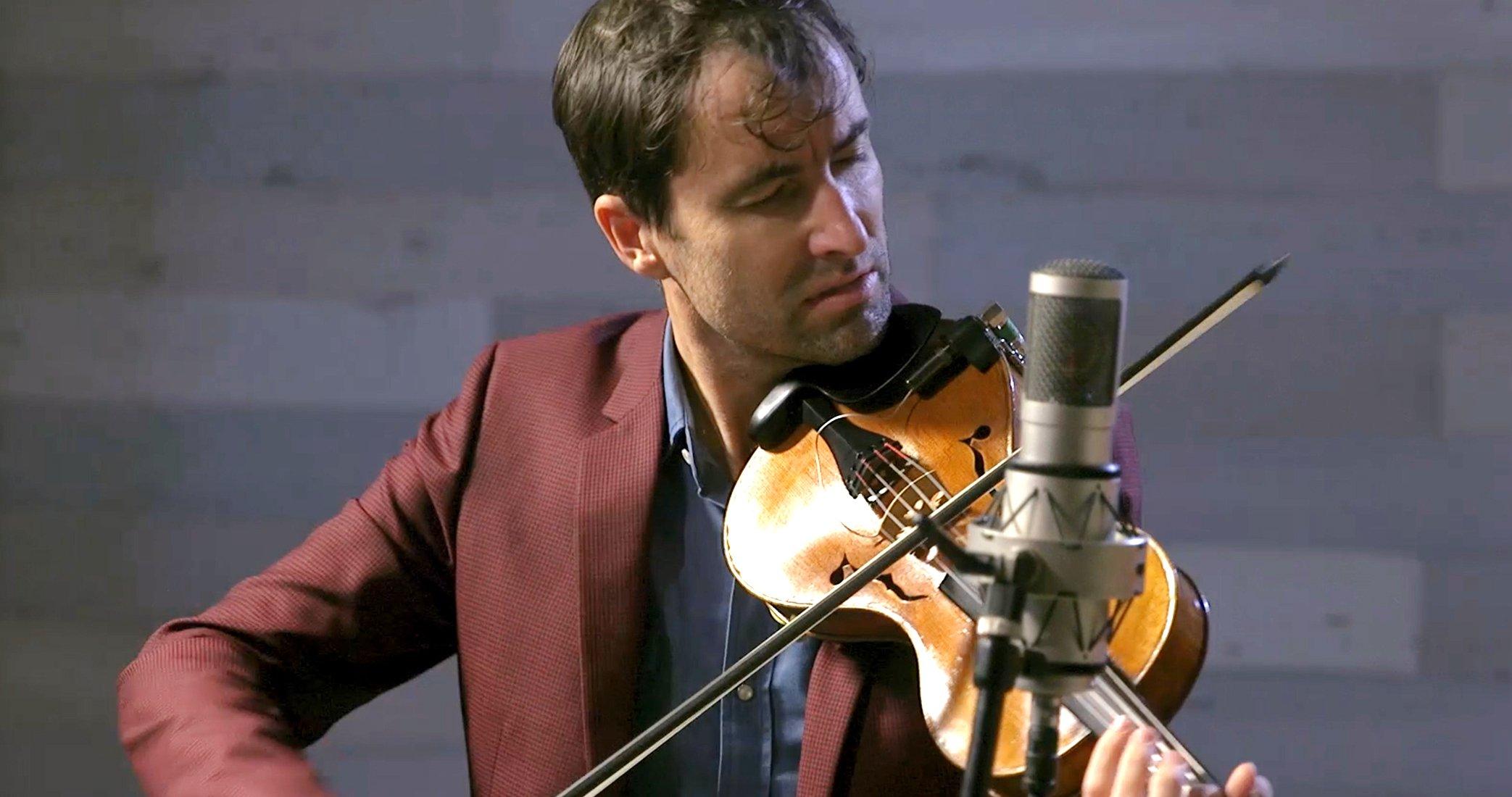
Andrew Bird
news
Andrew Bird Turns It Around With His "Olympians" Performance For Press Play
The multi-talented musician/composer shares his "darkest before the dawn" original song on the latest episode of the Recording Academy's original performance series
In the latest episode of Press Play, the incomparable Andrew Bird performs "Olympians" with help from Madison Cunningham. Have a look and listen:
From his new album, My Finest Work Yet, "Olympians" can be taken as a "socio-political allegory," according to Bird. Showing the contrast of despair and hope, the "darkest before the dawn" scenario song expresses how we as people can, "Spiral in our thoughts," said Bird, "get competitive about suffering" and ultimately, "Will ourselves out of these dark places."
Growing up in Chicago with a mother who loved classical music and a father who loved Merle Haggard and Buck Owens, Bird started playing violin at age 4. His influences grew to include jazz, gospel, Lester Young, Staples Singers, and much more. Early in his career, Bird became known as a virtuoso violinist, songwriter, composer, vocalist and whistler, pushing the boundaries of style and technique with each new album since his 1666 debut, Music of Hair.
Enjoy Bird and Cunningham's live rendition of "Olympians," and stay tuned for more exclusive original performances on Press Play.
La Santa Cecilia Scroll Down The Feed With "Winning" For Press Play
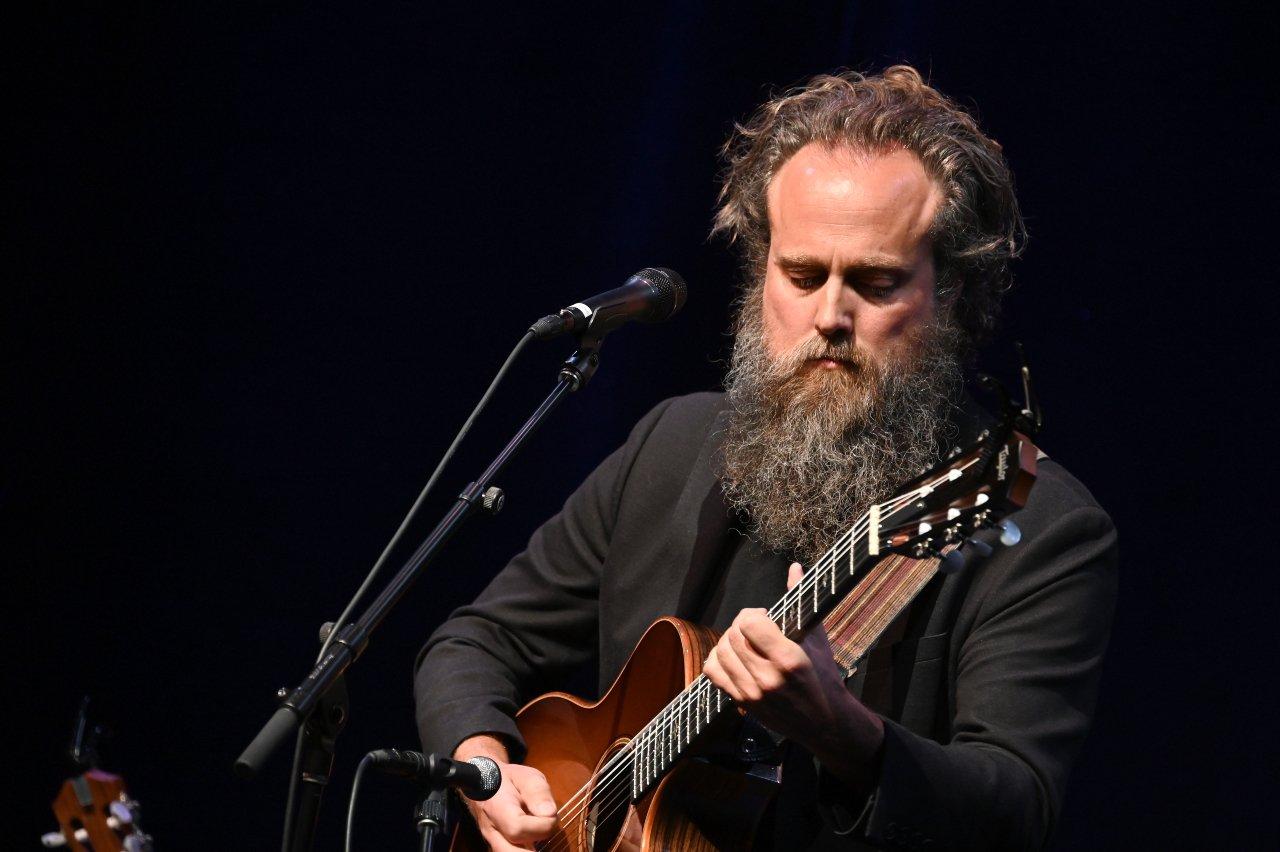
Photo: Stephen J. Cohen/Getty Images
interview
Iron & Wine Offers 'Light Verse': Sam Beam On His New Album, 2000s-Era Pigeonholing & Turning Up The Whimsy
If your memories of Iron & Wine are of melancholic folk songs for drizzly days, wipe your glasses dry: singer Sam Beam is a richly multidimensional artist. As displayed on his sophisticated, fancy-free new album with killer collaborators, 'Light Verse.'
Upon first impression, Sam Beam of Iron & Wine’s got a wildly endearing trait: he laughs even when something’s not explicitly funny. Even through Zoom, the man most of us know for aching, desolate folk songs will give you a tremendous lift.
"I like to joke around and stuff with my friends," the beardy and serene Beam tells GRAMMY.com — those friends including fellow mellow 2000s favorites, like Andrew Bird and Calexico. "Honestly, it's harder to be serious than it is to joke around most of my friends."
That’s partly what spurred the four-time GRAMMY nominee to make the shimmering, whimsical Light Verse. While it follows 2023’s soundtrack to the documentary Who Can See Forever, and 2019’s Calexico collaboration Years to Born, in relatively short order, it’s still the first proper Iron & Wine album since 2017’s Beast Epic.
Getting to the space to write waggish songs like "Anyone’s Game" ("First they kiss their lucky dice and then they dig themselves a grave/ They do this until it’s killing them to try") wasn’t easy. In conversation, Beam mentions "the pandemic that put me on my ear." In press materials, he expanded on exactly how it did.
"While so many artists, fortunately, found inspiration in the chaos, I was the opposite and withered with the constant background noise of uncertainty and fear," Beam wrote. "The last thing I wanted to write about was COVID."
"And yet, every moment I sat with my pen," he continued, "it lingered around the edges and wouldn’t leave. I struggled to focus until I gave up, and this lasted for over two years."
Thankfully, a Memphis session with singer/songwriter Lori McKenna relaxed his "creative muscles" and a series of tours and collaborations loosened him up even more. Beam assembled a dream team of musicians in Laurel Canyon, and the rest is history — Light Verse is a sumptuous delight.
Read on for how it came to be — and much more.
This interview has been edited for clarity.
Light Verse is the first non-collaborative Iron & Wine album since 2017. I imagine there’s sometimes pressure to just put music out for the sake of having it out. Whatever the case, I appreciate that you put time and thought into it.
Yeah, I mean, honestly, I just like making records with other people. You can only smell your own breath so long. I enjoy putting out records, but I feel like I grow more as a musician and person by working with other people. So, I’ll probably be doing more and more of that.
I don’t feel a whole lot of pressure, one way or the other. Maybe I’m just deaf and those things are screaming at me. But I just don’t listen.
What pressures have you faced in the music industry?
Oh, there are certainly lots of pressures. One is, I should probably be on top of my social media game, but I just can't seem to engage with it. I don’t know. That's how people make their entire careers these days, but I can't find a way to sustain it.
I can't think of a way that I could, because I definitely go through days without picking up my phone at all, so I just can't. I think if I could figure out a way to make it fun, I would do it.
What do you do with the time most people spend on their screens?
Playing guitar, or I do a lot of painting. I’m not saying I never pick up my phone, but I don't think about what could I share about my breakfast to the world, I just don't think about it. I'm private.
What was the germ of the concept behind Light Verse?
I don't really usually go in with a specific idea in mind. I just like to stack the deck with people that I like to play with, or that I like what they do. And so just see what happens, throwing a bunch of ingredients that you like individually, and just seeing if it makes a soup that you like.
My idea was to go in with these folks from L.A. that I had met along the way. David Garza, I'd been wanting to play with for a long time. I'd met Tyler Chester, who plays keys, when he was playing with Andrew Bird. Griffin Goldsmith plays with Dawes.
The songs were all developed. They were a bit lighter than some of the fare that I've put out before, far as just silly rhymes. They're a little more off the cuff.
I'm kinda mining the territory of the early '70s, where the folk writers were playing with jazz musicians. It just becomes a little more orchestra, or however you want to describe it. Not quite so straightforward.
But I had these off-kilter tunes and I got an off-kilter, talented band from LA, and I was just going to see what happened. And this is what happened.
Naturally, my mind goes to Joni Mitchell playing with Herbie Hancock and Wayne Shorter. What are your touchstones?
Well, those Van records — Astral Weeks and stuff. All the stuff in that time when people started playing cluster-y chords. I love that music. It’s so expressive. Ron Carter playing with Roberta Flack, even. They’re gospel-blues sorts of tunes, but they’re also folky [in their] structures and melodies.
Are you a super technically proficient guitarist? Can you play those crazy chords?
[Grins] I wouldn’t be able to tell you what chord it was, but I might be able to get my hand in the shape. I don’t read music. I just learned to play by ear, but I like to play guitar a lot, so I end up stumbling on most stuff.
I also fool around with a lot of open tunings, so you end up with some cluster-y, bizarre stuff with that, for sure.
Even just paying attention to Brian Wilson — he’s not a guitarist, but I feel like his work can teach guitarists a lot about voice leading and stuff.
Definitely. A lot of those jazz voices have been absorbed by pop music. You can hear Bill Evans all over pop music, especially in the ‘90s.
**Can you take readers through the orchestration on Light Verse? It’s so shimmery and rich and unconventional.**
Thanks. Yeah, we were borrowing from some of those jazz ensembles we’re talking about, and also Brazilian music.
Honestly, that Gal Costa tune, "Baby" — it’s the most famous one — it’s my spirit animal for this record. Just between the strings and the way the guitars and rhythm section work — the sparse way it comes and goes.
We approached it fairly intuitively. But I do feel like Paul Cartwright, who did a lot of those strings and charts and stuff, played a huge role as far as the identity of this record. Outside of the lyrics and the forms and stuff, just the way that he interpreted in this really expressive way. His charts and stuff were really great — and a lot of it's him playing, stacking stuff on his own. He's really, really talented.
He also grew up in Bakersfield, and since the violin is strung the way a mandolin is, he rocks a mean mandolin. He had all these different bass mandocellos and all this stuff. He was just, "What are we working on now? Hand me that thing," and just did all kinds of coloring. It's great.
Can you talk about approaching your work with more whimsy and color?
I feel like for some reason, for the longest time when I sat down to write a song, it was a time to say what I mean. And so when it came time to write a song, it ended up being really somber. Some of it is acidic, but somber for the most part.
Whereas for this one, I was just looking for more balance. Maybe I'm just too old to be impressed by that stuff, so I like balance — something that can resonate on something that people recognize but also is fun at the same time.
You can embrace both things at one time, that life is hard and also silly. And so that was the MO going into this one, and a lot of the songs that I chose to record were because they had both of those things going on at one time.
You’re a three-dimensional artist, but marketing can flatten musicians. Growing up with Iron & Wine, it tended to be packaged as "chill music for rainy days" or some such. Primary colors.
We all do that. We always try to define something. You know what I mean? You want to understand it, and by understanding, control it and define it.
All artists deal with that, for sure. It's frustrating when you want to be recognized. You want them to pay attention to other things, but it's also that we just want to be appreciated. Artists want to be appreciated for every little gesture we make, and it's not realistic. We do our best.
I feel like if you work hard, hopefully the stars will align and people will appreciate what you do.
What do you remember about the atmosphere of the music industry, back when big songs I don’t need to name came out?
You mean the vampire song and stuff?
Yeah.
It's definitely a lot different. The internet upended everything. I squeezed and slipped in the door just as the door was closing on the closed circuit of records and stuff.
It was more of a monoculture, where everyone was having the same conversation about the same groups of musicians. Now, [you can have] the entire history of recorded music at any moment of the day. It's hard to have the same conversation about things. That's been a big difference.
When you hang out and collaborate with friends like Andrew Bird, is there ever a sense of "We survived, we’re the class of 2000-whatever"?
Well, for one thing, it's hard to realize that you've been making music that long. Most bands don't even last that long. It's insane.
But it's also, I just feel really blessed. Maybe it's because I never studied music — my career feels like a fluke. I still feel blessed that people are still interested, blessed that I'm able to do this. I never thought it was in the cards, and so I just feel really lucky.
Sam Beam of Iron & Wine. Photo: Kim Black
I feel like one route to longevity is self-containment. Namely, self-production, which you’ve done forever. Where are you at with that journey?
I like autonomy. I see the musicians who are also producers in their own right, so usually I have a room full of producers and I don't end up using them. We all think everyone should get a producer credit, but I take it because I'm selfish.
But I like having the autonomy. That's why I still release on an independent record label. I like steering the boat. We're all steering around the same fog, but I don't like to have someone else to bitch about. I just bitch about myself.
It releases you from those moments where it’s like, "Sam, sales are down. We’ve got to get you in with Danger Mouse," or something.
Well, hell, man, I’d do that. But I know what you mean. The idea committees I imagine for most artists are really brutal.
Trend-wise, there’s pressure to chase trains that can lead to all music sounding the same.
The things that you're offered, really teach you a lot about what you're in it for. Or it's also after a while, your reasons for doing it change. I don't fault people for reaching for the ring, but I also feel like I was lucky in the sense that I was just doing it for fun.
And all the songs that have been popular were a surprise to me. The songs of mine that were embraced in a way were a surprise. I felt like there were others that might've been more popular or something, or I would've chosen to promote.
So, the lesson I learned is you have no idea. Just put your best into each one and see what happens because you really can't predict what's going to happen. In that sense, if you're trying to be popular or record something that sticks, you're trying to emulate something that's proven to be popular. And for me, that seemed like a recipe for disaster from the beginning.
I feel like if you wrote a really great song in the ‘90s or 2000s, it’d get heard. Not so much in 2024. You need to take it to market and bother everybody about it.
Yeah, it's a tricky thing. The internet has been wonderful as far as we have access to all kinds of stuff that we didn't have access to before, but it just also disperses all the attention. It's hard. There's a lot of great music happening right now — but like you say, you might never know.
What are you checking out lately that you’re really connecting with? Past or present.
I heard a great tune the other day by this woman named Barbara Keith, "Detroit or Buffalo," from 1972. Obviously not contemporary, but it was incredible. I'd never heard it before. I'm checking out stuff, trying to keep up. It's hard.
What do you like that would make people say, "Sam Beam likes that?"
Oh, in my case, it’s all over the place. I’m not real proprietorial with music. It’s something to experience. I’m not so much into dance music, but I like a lot of really intense electronic music. That might be surprising. Who knows?
Everything’s out there for the taking. It’s the universal buffet.
I think everyone can recognize a musical omnivore, and then not be surprised.
Anything else about Light Verse you’re raring to talk about?
We did get to sing with Fiona Apple, which was really a treat. That was unexpected, but a very welcome experience. And she turned a regular song into an incredible duet, which was really a surprise and a blessing.
What was it like working with Fiona?
I never actually met her. Because of the way technology works these days, she was in a whole other state and sent us the track. But a lot of the people that were playing and a lot of people in the room; we share band members like Sebastian Steinberg, and David Garza plays with her a lot too.
One of the reasons that I recorded there in LA with Dave Way is because they had made their last few records with Dave, and Sebastian had been in my ear about, "You got to go record Dave." And it turns out he was right. It was great. She had a lot of friends in the room, so it wasn't too hard to convince her.
Beirut's Zach Condon Lost His Sense Of Self — Then Found It Within A Church Organ
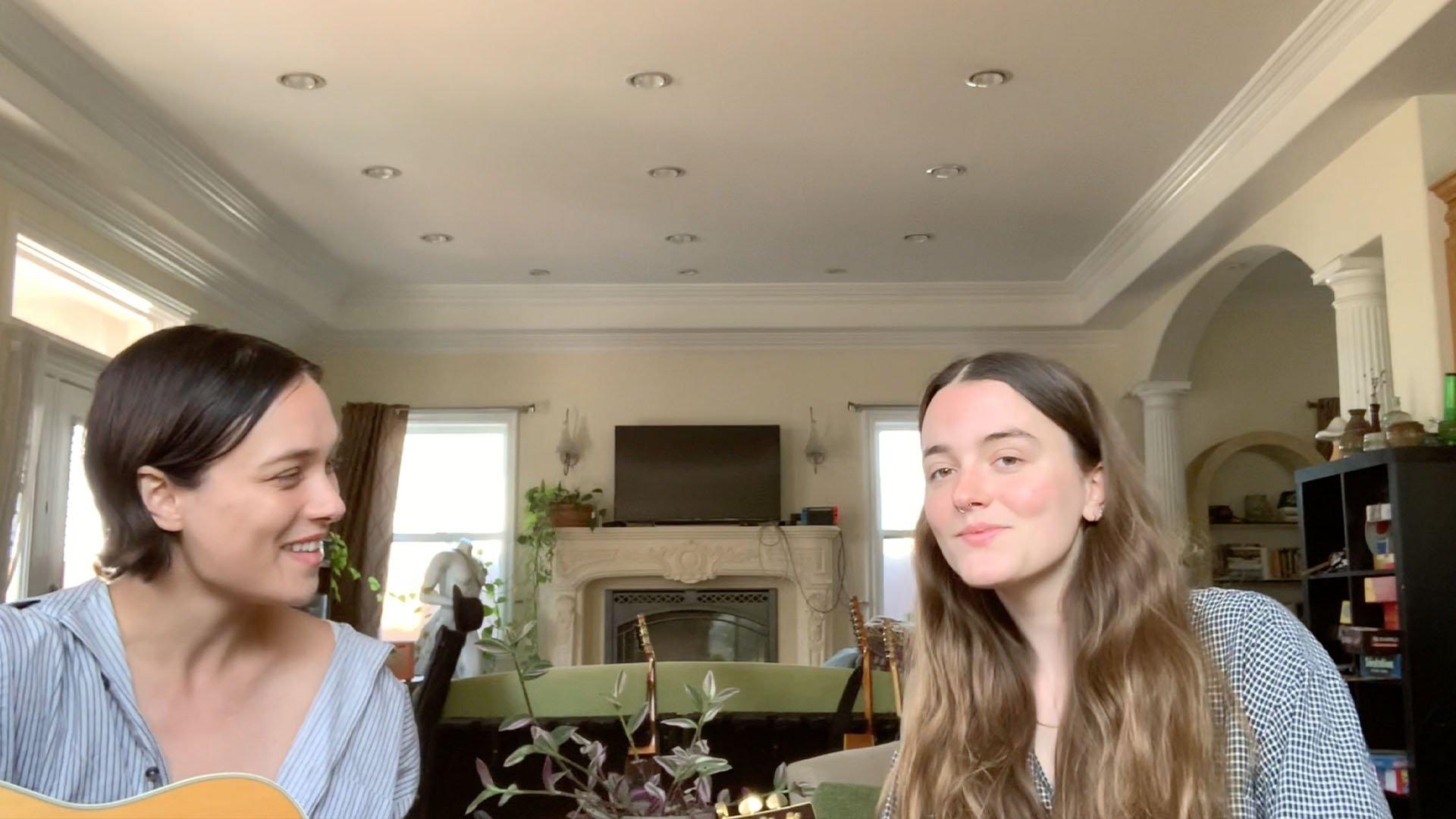
Photo: Courtesy of Abby Sage
video
Press Play: Watch Abby Sage Feed Her “Hunger” In This Acoustic Performance Of Her Single
Rising indie star Abby Sage performs “Hunger,” an unapologetic track about sexual liberation from her debut album, ‘The Rot.’
With "Hunger," rising indie star Abby Sage takes autonomy of her body. It’s a story of shameless self-discovery as she submits to her natural desires while simultaneously breaking down the toxic ideas she learned about sex in her adolescence.
"Feed my hunger/ No shame, I'm just a beginner," she croons in the chorus. "It's my own wonder/ Don't press, I'm just a beginner."
In this episode of Press Play, watch Sage deliver an acoustic performance of the single from her debut album, The Rot, which she released on March 1. According to a statement, the project is largely about "the decomposition and reconstruction of everything I was taught," including sex, anxiety, and more.
Sage said "Hunger" is "the most important song to me on the album" adding, "I wish I heard a song like this when I was first exploring my sexuality and my sexual journey, and for that reason, I hope it reaches people."
This May, Sage will embark on an international tour that begins in Los Angeles and concludes in London, with support from gglum, spiderblush, and Jayla Kai.
Watch the video above to hear Abby Sage's empowering performance of "Hunger," and remember to check back to GRAMMY.com for more new episodes of Press Play.
Watch Genia Narrate The Pain Of Heartbreak In This Raw Performance Of "Dear Life" | Press Play
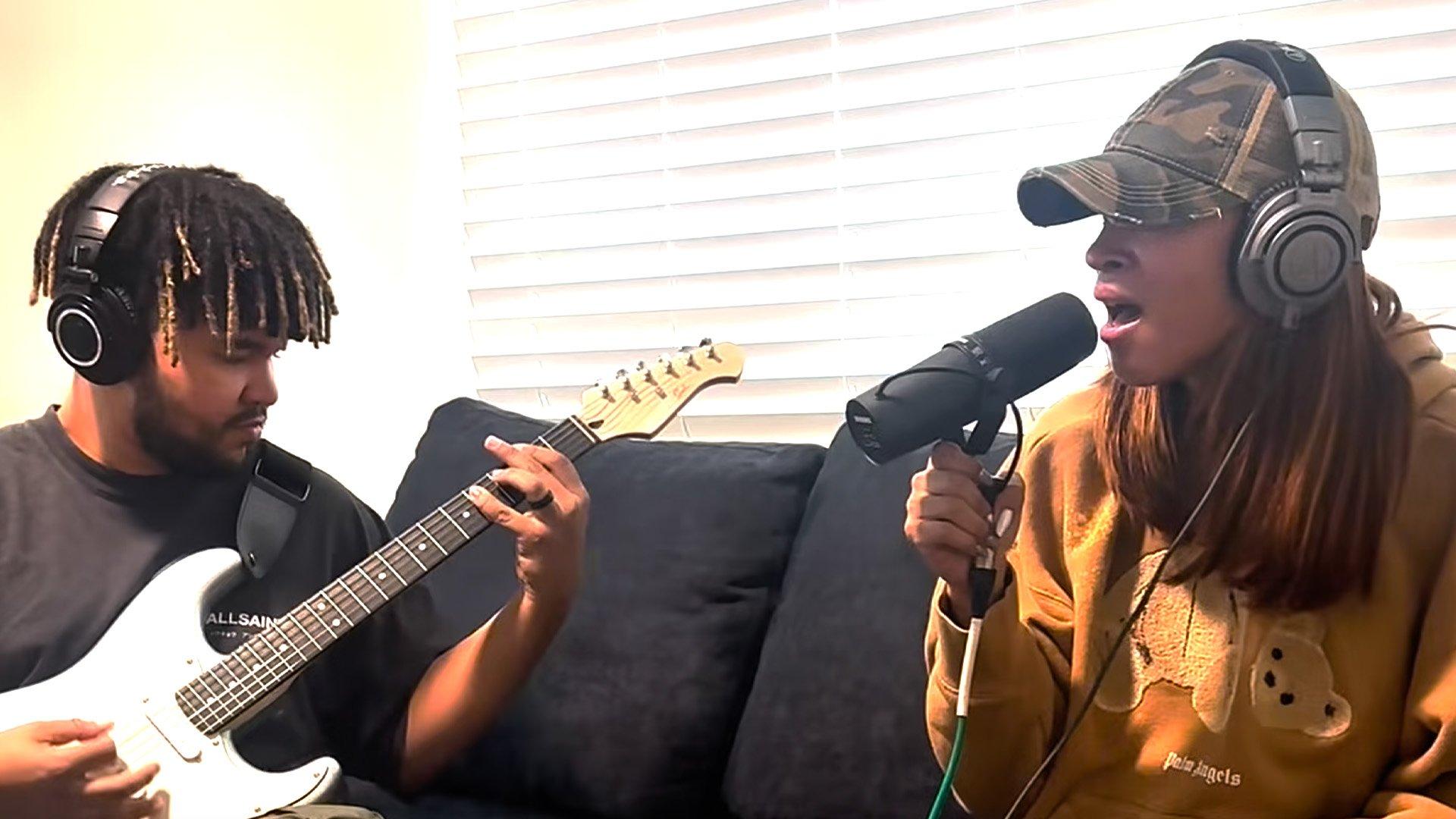
Photo: Courtesy of Genia
video
Press Play: Watch Genia Narrate The Pain Of Heartbreak In This Raw Performance Of "Dear Life"
R&B singer Genia offers an acoustic rendition of "Dear Life," one of the singles from her forthcoming mixtape, '4 AM In The Ville,' out April 19 via Def Jam.
On "Dear Life," R&B singer Genia pens a farewell letter to her lover — while simultaneously reflecting on how the intense saga crumbled her.
"I can't take anymore/ Put my pride aside, thought you could save me," she cries in the first verse. "These days, I don't know what I need/ You destroy me from the inside out/ If I go off the deep end/ You'll be sure not to bring me back."
In this episode of Press Play, watch Genia deliver a stripped-down performance of the vulnerable track alongside her guitarist.
The California native released "Dear Life" on Nov. 10, via Def Jam Recordings. She has also dropped three more singles — "Like That," "Know!," and "Let Me Wander" — leading up to her sophomore mixtape, 4 AM In The Ville, on April 19. 4 AM is a sequel to her debut, 4 PM In The Ville; both projects are inspired by Genia's experience of growing up in Victorville, California.
""[The songs] explore the different stages of grief in a relationship," she revealed in an interview with Urban Magazine. "The second tape is really me touching on falling in love, betrayal, anger, and rape."
Watch the video above to hear Genia's acoustic performance of "Dear Life," and check back to GRAMMY.com for more new episodes of Press Play.
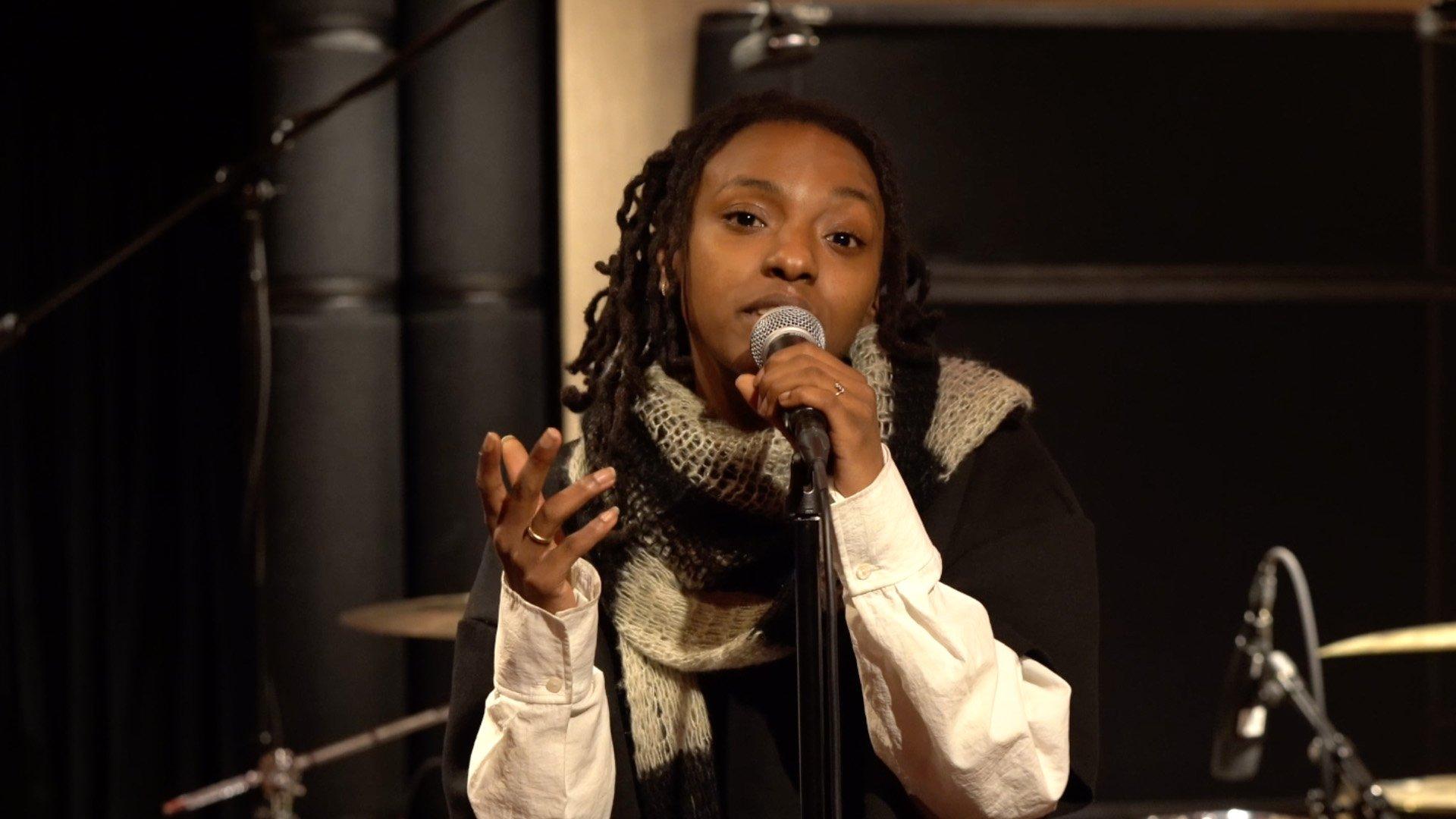
Photo: Courtesy of Kenya Vaun
video
Press Play: Watch Kenya Vaun Reminisce About "Yesterday" In This Sentimental Studio Performance
Philadelphia native and R&B newcomer Kenya Vaun honors the beauty of childhood in this stripped-down performance of "Yesterday," a track from her new EP, 'The Honeymoon Phase.'
Now in her early twenties, R&B rookie Kenya Vaun would give anything to return to her childhood adolescence — the days of block-turned-house parties and no bills.
"Feels like it was only yesterday/ And life was so easy yesterday," Vaun raps in the chorus of her new song, "Yesterday." "If I had the chance to do it again/ I'd do it the same/ The joy and the pain/ The coldest of winters/ The summertime rain/ No, I wouldn't change my yesterdays."
In this episode of Press Play, watch Vaun deliver a live rendition of the track, straight from the recording studio.
"Yesterday" arrives on Vaun's latest EP, The Honeymoon Phase, which dropped March 22 via 300 Entertainment. She also released an accompanying music video, filmed in her hometown, Philadelphia.
"'Yesterday' talks about my experiences when I was younger because that is a huge part of what made me who I am today," Vaun said in an interview with Rated R&B. "Seeing how times are today, it's kind of like, 'Dang. Imagine if I grew up during this time.' I don't know how I would be, like, for real."
Watch the video above to hear Kenya Vaun's nostalgic performance of "Yesterday," and check back to GRAMMY.com for more episodes of Press Play.
25 Artists To Watch In 2024: Chappell Roan, VCHA, Teezo Touchdown & More
